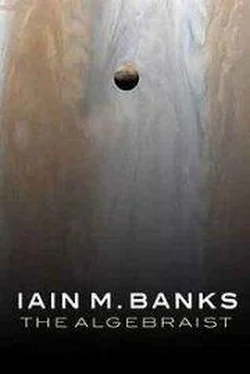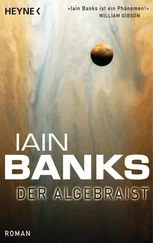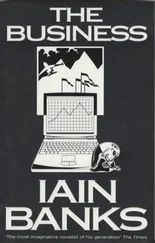Had something like this happened everywhere? It would take over two centuries for Ulubis to discover if it was part of a wider catastrophe or had been singled out for its own specific disaster. From being no more remote than any other system at the end of a single wormhole — and so orders of magnitude less remote than the many hundreds of thousands of Faring systems still to be connected or reconnected — Ulubis, its principal planet Sepekte, its three significant inhabited moons including ’glantine, its thousands of artificial habitats and the twenty billion souls that the whole system contained were fully as remote and exposed as they’d always seemed from any casual glance at a galactic star chart.
The Guard, Navarchy Military and surviving units of the Ulubis Ambient Squadron repaired and regrouped. Martial law was declared and a War Emergency Plan actioned which turned the bulk of the system’s advanced productive capacity to weapons and war craft. As a consequence, Kehar Heavy Industries, Saluus’s father’s company, expanded and prospered beyond its founder’s most avaricious fantasies, and Saluus went from wastrel heir to a great fortune to inheritor-in-waiting of a vast one.
In the system hierarchy, thought was given at the highest levels to attempting to construct a wormhole of Ulubis’s own and a carrier fleet to take one end of it to Zenerre. But aside from the vast cost and the point — assuming a portal would be heading in the other direction before too long — that it would be a waste of time and effort which would bring reconnection no quicker, there was one clinching argument that would apply until either no signal arrived from Zenerre or word came of an utter breakdown in civil society: in the Mercatoria only Engineers were allowed to make and emplace wormholes.
There were sanctions and punishments for those systems and rulers who even began a “hole-creation programme without explicit permission, and that permission had not been present in the Mercatoria’s pre-agreed War Emergency Plan for Ulubis.
Back in space, distributed around the Lagrange point where the portal had lain, the few pieces of recovered Beyonder ships indicated that the portal’s attackers had been made up from the same three groups which had troubled Ulubis and some of the nearby volumes for thousands of years: Transgress, the True Free and the BiAlliance, for this one occasion working in concert and in far greater numbers than they ever had before.
Anxious, on edge, waiting for whatever a Beyonder invasion might bring, the people of the system reverted to a state something more like that of Earth’s rHumanity before it had been fully brought into the galactic community.
It was a truism that all civilisations were basically neurotic until they made contact with everybody else and found their place within the ever-changing meta-civilisation of other beings, because, until then, during the stage when they honestly believed that they might be entirely alone in existence, all solo societies were possessed of both an inflated sense of their own importance and a kind of existential terror at the sheer scale and apparent emptiness of the universe. Even knowing that the rest of the galactic community did exist — at least in some form, even in a worst case — the culture of Ulubis system shifted fractionally towards that earlier, pre-ascensionary state.
Restricted by martial law in new and annoying but sometimes oddly exciting ways, coming to terms with their sudden isolation and newly appreciated vulnerability, people lived more for the short term, clutching at what pleasures and rewards might be available today, just in case there really was no tomorrow. No great breakdown in society took place and there were no significant riots or rebellions, though there were protests and crack-downs, and, as the authorities admitted much later — much later — Mistakes Were Made. But the system held together rather than fell apart, and many people would look back on that strange, unsettled epoch with a sort of nostalgia. There had been something feverish but vivid about the time, a reconnection with life after the disconnection with everybody else, which led to what even looked from some angles suspiciously like a cultural renaissance for what people were now starting to call the Ulubine Disconnect.
Fassin missed out on most of the excitement, taking every opportunity he could to go delving, as if frightened that he might not be able to do so in the future. Even when he was living back in real-time he was insulated from the extremes of the system-wide turmoil of fear and nervous energy by being on ’glantine rather than Sepekte or its ring habitats, then by living within the Sept, at one of its five seasonal houses, rather than in Pirrintipiti or any of the planet-moon’s other major cities. He still travelled, spending occasional holidays in Pirri or off-’glantine, and that was when he felt the strange new atmosphere of freneticism most keenly.
Mostly, though, he was in Nasqueron, nestled in a fragile little gascraft, occasionally at normal life-speed, flying with the younger Dwellers, riding the gases alongside them, buffeted by the gas-giant-girdling, planet-swallowing super-winds and whirling hyper-storms of the planet, sometimes — more often and much more productively, though far less excitingly — floating sedately in a study or a library in one of the millions of Dweller cities with one of the more elderly and scholarly Dwellers, who alone in the system seemed perfectly unconcerned about the portal’s demise. A few of the (rare) polite ones expressed the sort of formal shame-but-there-you-go sympathy people tend to exhibit when an acquaintance’s elderly relative expires peacefully, but that was about it.
Fassin supposed that it was foolish to expect anything else from a race that was as ancient as the Dwellers claimed to be, who had supposedly explored the galaxy several times over at velocities of only a few per cent of light speed long before the planetary nebula that gave birth to Earth, Jupiter and the Sun had even formed out of the debris of still more antique generations of stars, and who still maintained they felt vaguely restricted not by that absolute limit on the conventional pace of travel but rather by the modest scale of the galaxy that these staggeringly long-ago, almost wilfully leisurely sets of voyages had revealed.
The days, weeks and months of waiting and preparation for an invasion became a year. The Beyonder attacks, rather than increasing, faded away almost to nothing, as though the portal assault had been one last insane hurrah rather than the logical, if wasteful, precursor to a war of conquest. The years added up towards a decade and gradually people and institutions relaxed and came to believe that the invasion might never come. The majority of the emergency powers lapsed, though the armed forces remained in high numbers and on high alert, sensors and patrols sweeping the volumes of space around Ulubis, seeking a threat that seemed to have disappeared.
In four directions lay almost empty intergalactic nothingness: barren volumes holding a few ancient, exhausted cinder suns with life-free systems or none at all, a scattering of dust and gas clouds, brown dwarfs, neutron stars and other debris — some of these, or the space in between, technically life-supporting for Slow exotics, Cincturia and Enigmatics, but patently devoid of any species who cared or could even understand the fate or concerns of the people of Ulubis — but no allies, no one to help or offer assistance or support, and certainly no portal connections.
Down-arm, nearly parallel with the galaxy’s wispy limit, heading into the thickening mass of gas and nebulae and stars, was Zenerre. Inwards, between Ulubis and the galactic centre spread a vast mass of Disconnect; the Cluster Epiphany Five Disconnect, millions of stars spread throughout cubic light-centuries which, it was believed, still supported worlds that had once been part of the civilised, connected, “hole-networked galactic community until over seven thousand years earlier and the Arteria Collapse which had preceded the War of the New Quick and all the excitement and the woes that had flowed from it.
Читать дальше












